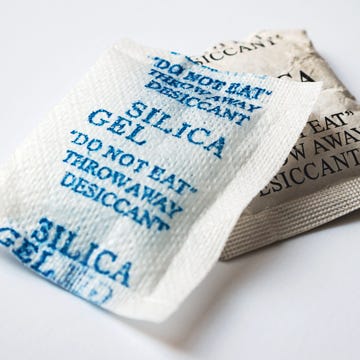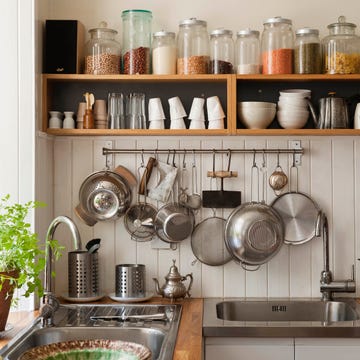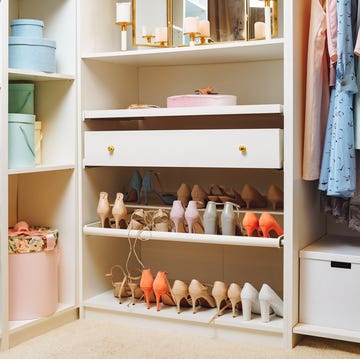Let’s face it - decluttering feels like a drag. No matter how much ‘joy the item sparks’, at the end of the day you’re still sitting in a pile of stuff, gradually making hard decisions on whether or not to keep things. Before you know it, a whole afternoon ticks by.
But things could be worse. There are some items that are especially irritating to sort through – things that can leave you grinding your teeth and wishing you could just slam it back in the drawer, and forget it ever existed. But don’t be defeated! Here, we’ve listed 7 of the most frustrating things to declutter, and how to deal with them, so you don’t have to worry when you inevitably stumble upon them.
1. Receipts
We’ve all got a pile of receipts at home. How are there so many? It happens quickly when you set them aside with any new purchases ‘just in case,’ or maybe you just never get around to throwing them out of your handbag. Either way, a stack gradually builds up and you can’t help but sigh when the time comes to sort through them.
What to read next
But don’t panic just yet! Going through receipts doesn’t have to be such a chore. The main thing you need to check is what each receipt is for – that’s it. The only reasons you’d need to keep any is as proof of purchase for a guarantee/warranty (and for your consumer rights) or for tax records or for any high-ticket designer items you plan to sell later. These can be filed and dated for safe-keeping. The rest can be shredded.
If you don’t have a shredder and plan to bin the receipts (note; you generally can’t recycle receipts due to the type of paper it’s printed on), just make sure your card information isn’t printed on the receipt in full. This sometimes happens if you’re handed the merchant’s copy. These will need to be destroyed instead.
2. Foreign currency
One thing that can weigh a lot and be awkward to dispose of is foreign currency – specifically coins. When you’ve just returned from a holiday, there’s often not enough to warrant exchanging it, but enough to rattle around your drawers and dirty everything it touches. But, you can’t throw it away, it’s money after all.
If you don’t see yourself likely to use the currency in the future, many charities will accept it. Oxfam accepts postal donations via a Freepost service, and you can drop it off at local branches too. You can also support the Royal British Legion by donating your unwanted currency at Sainsbury’s Travel Money Bureaux. The Royal National Institute of Blind People and The Air Ambulance Service also accept currency donations.
For any currency you decide to hang onto, use a coin purse to keep it together, rather than letting it slide around your drawers!
3. Chargers and cables
As we update our smartphones, tablets, cameras, e-readers and laptops, it’s easy to build up a plethora of tangled chargers and cables. The trouble is, we don’t want to throw any away for risk that we will need them later. So, they gradually build up, until they’ve filled a drawer or two.
For any cables you do use, untangle and organise with cable ties to keep them compact and tidy. You can also label them if you’re worried about forgetting what they go to later. For any you don’t use, or have forgotten what they go to, check that you’ve already got the necessary cables for your everyday tech before you let them go – consider items you use less often as well, such as your printer. If you’re sure the cables are no longer needed and are still in working order or can likely be repaired, then they can be recycled. Recycleyourelectrical.org.uk can help you to find a local recycling point.
Do not keep and use any cables which are showing obvious signs of damage.
4. Old paperwork
All kinds of paperwork get posted through the letterbox each day. From household bills to insurance documents and bank statements, the stack soon mounts up. Once we’ve dealt with them, we don’t know whether to keep or to get rid of them – and what’s the best way to get rid of them without the risk of our information being stolen?
To start with, the only paperwork you should keep includes:
- Birth/marriage/civil partnership/divorce/adoption/death certificates
- Wills and powers of attorney
- House deeds and rental agreements
- ID cards and passports
- National insurance numbers
- Insurance certificates
- Car VC5 logbook
- Exam results and qualification certificates
- Pension documents
- NHS medical certificate card and records
- Pet medical records and vaccination certificates
- Mortgage documents
- Tax office documents
Bank statements and utility bills should be kept for a year before disposal; these can often also be accessed online. HMRC recommends keeping payslips for at least 22 months after the end of the tax year in which they were issued. But, it’s worth extending this if you receive variable pay. You should keep insurance certificates, but the policy info may be available via your online account; check before destroying. Those that are self-employed or need to file a tax return may need to keep certain documents for longer; check with HMRC.
The best way to destroy paperwork you no longer need is to shred it. Otherwise any documents which contain personal information can be cut by hand with a pair or scissor paper shredders.
5. Other people’s clutter
Sometimes, other members of the household will also accumulate a lot of clutter. It can be very difficult and frustrating to sort through such things, as you must make decisions on their behalf.
In fact, we wouldn’t recommend this, in case you remove anything of value to them. If possible, get them involved in the process so that they understand the effort involved and keep their clutter monitored going forward. This can be especially beneficial for young children. It also helps because we’re more likely to hang onto items we’re unsure about, and the owner will show you what it’s worth to them and potentially put things in a new perspective.
If you’re sorting through items after a loved one has passed away, this is a very difficult and sensitive process - it's not frustrating, but it is emotional. I recommend working your way through gradually, starting with items of less sentimental value and ending with those which have the most sentimentality attached. It can help to have a secondary person there to give you a fresh perspective. Try not to get lost down memory lane as you sort – you will lose time and it will demotivate you; set aside a dedicated time for this later. Be patient with yourself as you sort through such items.
6. Kitchen knives
We rack up many kitchen knives over the years, which can chip, corrode or crack across the handle, meaning we can no longer use them. But, what is the best way to dispose of them? While out of service, they’re still plenty sharp and can’t just be tossed in the bin!
To get rid of old kitchen knives, first the blade needs carefully securing in cardboard. Tape it on and make sure it’s sealed and can’t fall off or be pierced. Next, place it within a secure, lidded container and mark the outside ‘SHARP KNIFE CONTAINED – HANDLE WITH CARE.’
Kitchen knives can often be recycled at scrap metal facilities at your local recycling centre but call ahead to confirm. When you drop it off, make sure to explain what it contains.
If your knife has just dulled, try to restore it with a knife sharpener before disposing of it.
7. Kitchen appliances
We love our kitchen appliances. Kettles, toasters, coffee machines, microwaves, juicers, blenders and much more fill our worktops and see daily use. But, when the time comes to replace or update such appliances, what should you do with the old models?
If they're still in working order, there’s always the option of listing them on eBay or Vinted to make some money. Or, if they’re fully functioning, local charity shops will likely accept them too. But you should check this beforehand and keep in mind large white goods will likely not be accepted (but it's always worth checking).
If the electrical item is broken, there is the option to recycle it too. You can use recycleyourelectricals.org.uk to find local points where you can drop it off. This tool can help you find local options which can offer repairs and accept donations too.


















